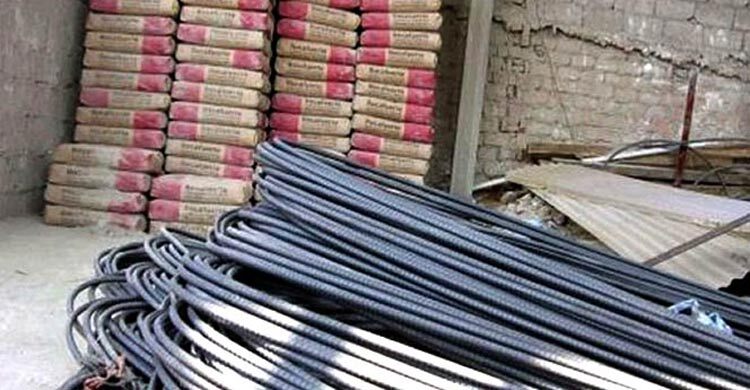Rod-cement sectors caught in a three-pronged attack

The country’s rod and cement sectors are struggling under a three-fold pressure—plummeting demand, surging production costs, and high raw material prices—causing many to sell at a significant loss.
The economic slowdown has already delayed development projects, with the situation worsening after recent political unrest, say industry insiders.
Slumping sales and mounting losses
Demand for steel has dropped around 70% and cement by about 20% over the past two months, primarily due to halted government projects.
Roughly 65% of the nation’s steel output—120,000 tonnes monthly—is normally consumed by such projects, now mostly on pause. This drop has pushed rod prices down by Tk 6,000-7,000 per tonne, leaving stocks to pile up in warehouses.
Steel producers, who increased production hoping for a market recovery, are now forced to reduce operations, which in turn raises per-unit costs.
To keep business afloat, many are selling rods at losses of Tk 10,000-15,000 per tonne.
Tapan Sengupta, Executive Director of BSRM Group, a leading steel manufacturer, stated, “Sales in the sensitive steel sector have dropped by nearly 50 percent due to the changed political climate. We’ve had to cut production.”
BSRM Group, which targets an annual rod production of 1.8 million tons, is now running only two out of four modules at its Mirsarai, Chittagong melting unit. Similarly, Suman Chowdhury, Executive Director of Rani Re-Rolling Steel Mills, explained, “We invested in steel production based on the previous government’s plans. With development activities now halted, contractors are unable to settle payments, leading us to incur losses.”
"Our production capacity has dropped from 90 percent to just 30-35 percent. Turning a profit is out of the question; we’re struggling to keep the factory operational. It costs Tk 90,000 to produce one ton of rods, yet we’re selling at a Tk 10,000-15,000 loss per ton just to cover expenses," Chowdhury added.
The fall in demand has led to a significant price decrease in the market, affecting retail buyers as well. Mahbubur Rahman, a government employee from Mirpur-1 in Dhaka, noted that he purchased rods at Tk 91 per kg in March, but by October, the price had fallen to Tk 83 per kg.
Facing mounting losses, industry sources say many factory owners have cut shifts, running two instead of three and closing for two days each week rather than one, to manage overheads amid declining demand.
Prices and industry capacity
At the factory level, 75-grade mild steel rods have dropped to Tk 86,000-88,000 per tonne, down from Tk 92,000-94,000 two months prior. Similarly, 60-grade rods now sell at Tk 78,000-81,000 per tonne, marking a sharp decrease.
Historically, rod prices once hit the Tk 1 lakh mark. Today, however, the sector’s 10 million tonne production capacity far exceeds the country’s 7.5 million tonne demand, according to Bangladesh Steel Manufacturers Association (BSMA).
Suman Chowdhury, BSMA General Secretary, called on the interim government to revive development projects and cut import duties on raw materials to stabilise the industry.
Cement sector hit by declining demand and rising costs
The cement sector in Bangladesh is experiencing similar pressures as the steel industry. Recent political and economic disruptions have led to a significant drop in demand, with sales down by 20-30 percent. Zakaria, a wholesale cement trader in Dhaka’s Mirpur and owner of Messrs. Zakaria Enterprises, reported that daily sales have plummeted from the usual 10,000-12,000 sacks to just 200-250 sacks on average.
According to the Bangladesh Cement Manufacturers Association (BCMA), Bangladesh’s cement industry, which consists of around 40 companies (some under shared ownership), has an annual production capacity of 7-8 million tonnes, against a domestic demand of roughly 4 million tonnes.
BCMA Executive Director Sankar Roy shared, “Demand has dropped sharply, yet production remains unchanged. As this industry relies entirely on imports, rising import costs are hurting us. We used to see an annual growth of 15 per cent, but we’re now facing a 20 per cent decline within just four months.”
Further challenges arise from increased shipping costs due to syndication among lighter ships at Chittagong port, which has driven up transport costs. Roy also voiced concerns over the Bangladesh Water Transport Coordination Cell (BWTCC) being given exclusive oversight, fearing this could lead to a monopoly.
“We urge the government to take immediate action by suspending advance income tax, reducing customs duty on raw materials, and dismantling the shipping syndicate to protect our industry,” he said.

